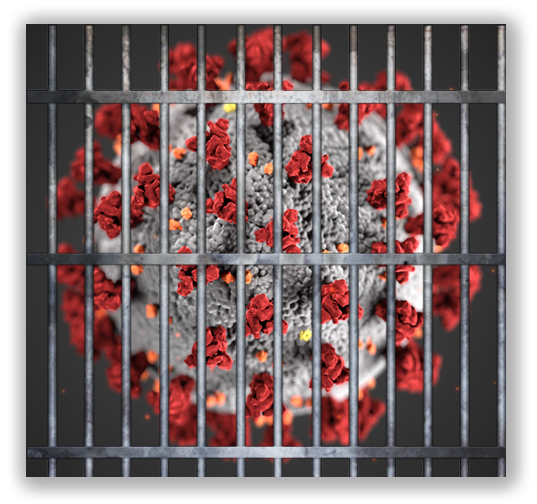We post news and comment on federal criminal justice issues, focused primarily on trial and post-conviction matters, legislative initiatives, and sentencing issues.

SKYROCKETS IN FLIGHT
The Bureau of Prison’s official count of inmates with COVID-19, already widely disbelieved as being a gross undercount, skyrocketed last week from 799 on Sunday night to 1,926 inmates at 51 facilities last night.
 About 70% of all infections are at the federal prisons at Terminal Island, California, the Federal Medical Center at Ft. Worth, Texas, and the Butner prison complex in North Carolina. Terminal Island has the highest number of COVID-19 cases at 620 inmates.
About 70% of all infections are at the federal prisons at Terminal Island, California, the Federal Medical Center at Ft. Worth, Texas, and the Butner prison complex in North Carolina. Terminal Island has the highest number of COVID-19 cases at 620 inmates.
Eleven inmates died last week, bringing the total COVID-19 deaths in the BOP to 38. The one that sparked the most outrage was that of Andrea Circle Bear, a 30-year old pregnant inmate with a 26-month sentence. Assigned to the women’s Federal Medical Center Carswell, also in Fort Worth, she was put on a ventilator March 31 and delivered her child by caesarean section the next day. Ms. Circle Bear never came off the ventilator, and died of COVID-19 on Apr 28.
“It’s an outrage that Andrea Circle Bear, a near full-term, pregnant woman with underlying medical conditions, lost her life while in federal custody,” Congressman Jerrold Nadler (D-New York), chairman of the House Judiciary Committee, told Reuters. “We have a moral and constitutional duty to prevent additional deaths among those who are detained or imprisoned.”
Sen. Richard Durbin (D-Illinois), who sits on the Senate Judiciary Committee, said, “Simply put, this tragic death was preventable.”
The BOP warned a week ago that as it began testing, the numbers would go up. But the BOP may not have been prepared for what the tests show: figures provided to Associates Press last week showed that out of 2,700 tests systemwide, nearly 2,000 inmates –¬ over 70% – have come back positive, strongly suggesting there are far more COVID-19 cases in the system than anyone knows.
 Felicity Rose, director of research and policy for criminal justice reform at the progressive advocacy group FWD.US, said “the lack of testing is leading to a false sense of security,” NPR reports.
Felicity Rose, director of research and policy for criminal justice reform at the progressive advocacy group FWD.US, said “the lack of testing is leading to a false sense of security,” NPR reports.
“We know that it’s spreading among staff, and that staff are bringing it into and out of the facilities,” Rose said. “We know there are people who are asymptomatic and are able to pass it along, but we just don’t know how many.”
AP reported that BOP’s response “to the growing coronavirus crisis in prisons has raised alarm among advocates and lawmakers about whether the agency is doing enough to ensure the safety” of inmates. At the same time, the AP said, BOP “communication policies are leaving families in the dark about their loved ones’ potentially life-threatening condition.”
The BOP reports on its website that MDC Brooklyn and MCC New York have no reported inmate COVID-19 cases as of May 3. In a filing that same day, however, the wardens of those facilities told the US District Court that they had 11 confirmed inmate COVID-19 cases.
In the class action suit pending against the BOP’s management of COVID-19 at FMC Devens, an expert on infectious diseases in prisons told the court, “As of April 26, 2020 FMC-Devens was reporting a single confirmed prisoner case of COVID-19. But because the facility is testing only symptomatic prisoners, this data point is not meaningful. It certainly does not mean that the facility is safe. Everything we know about the presentation and transmission of this disease points to the fact that when you have one confirmed case under a symptomatic protocol, it is fair to assume that there are many more cases at that facility..”
Following the Dept of Justice Inspector General’s decision to investigate whether the BOP is complying with available guidance and best practices on COVID-19 outbreaks, Senators Durbin and Chuck Grassley (R-Iowa) asked the IG to also look at whether the BOP is properly using its legislative authority to transfer at-risk inmates to home confinement:
We are concerned that BOP is not fully and expeditiously implementing relevant statutory authority and directives from the Attorney General. We are also concerned about how closely BOP is following CDC guidance or taking other preventive measures to adequately protect BOP staff and inmates from the spread of COVID-19… We also worry that BOP is significantly underestimating the rate of COVID-19 infection in BOP facilities because BOP has not yet conducted the number of tests on staff or inmates appropriate for facilities where a highly contagious virus can be easily spread.
Although an ACLU class action case against FCI Oakdale (Louisiana) was dismissed on jurisdictional grounds ten days ago, at least five other cases are active. In Massachusetts, the judge in the FMC Devens case heard argument on a preliminary injunction last week, and is expected to rule this week.
A motion for a preliminary injunction has been filed in Connecticut federal court by a class of inmates at FCI Danbury, seeking to have female inmates and vulnerable male inmates placed in home confinement immediately. The plaintiffs argue that at FCI Danbury, site of a what they call a “dangerous and uncontrolled” COVID-19 outbreak, the BOP has failed to effectively protect inmates.
 In a suit against MDC Brooklyn, the report of the plaintiffs’ expert – Dr. Homer Venters – criticized the sick call request system, hygiene, and using temperature measurement to diagnose COVID-19. Of more concern, the report accused MDC Brooklyn of destroying records of inmate sick call. Dr. Venters, an epidemiologist specializing in disease in prisons, told the court he was “alarmed by the facility’s failure to implement simple procedures, in-line with the Center for Disease Control guidelines, that could identify patients ill with COVID-19, prevent the spread of COVID-19 throughout the facility, and ensure that high-risk patients receive adequate care.”
In a suit against MDC Brooklyn, the report of the plaintiffs’ expert – Dr. Homer Venters – criticized the sick call request system, hygiene, and using temperature measurement to diagnose COVID-19. Of more concern, the report accused MDC Brooklyn of destroying records of inmate sick call. Dr. Venters, an epidemiologist specializing in disease in prisons, told the court he was “alarmed by the facility’s failure to implement simple procedures, in-line with the Center for Disease Control guidelines, that could identify patients ill with COVID-19, prevent the spread of COVID-19 throughout the facility, and ensure that high-risk patients receive adequate care.”
In a similar suit against the MCC New York, the warden complained to the court last Friday that the BOP should not permit a similar inspection of its facility by a plaintiff’s expert. “Allowing an inspector to enter MCC would not only raise the usual security concerns,” the warden said in a filing, “but would present particular concerns given the COVID-19 pandemic. One key element of BOP’s protocol in response to the pandemic is to limit to an absolute minimum the number of people entering the facility, as discussed above. Permitting an outside inspector to enter MCC would run counter to those efforts.”
In Ohio, where a federal judge ruled that the BOP’s operation of FCI Elkton amounted to an 8th Amendment violation, BOP lawyers argued last week that the measures Elkton took to curb the virus’s spread had been effective. In an emergency motion to the 6th Circuit for a stay of the district court’s order, the BOP contended that its COVID-19 containment “efforts have been working as the number of new cases has been reduced.” The 6th Circuit denied the BOP’s request for stay.
 Writing in Forbes, Walter Pavlo said, “I’m not sure where the attorneys got their stats but according to the BOP’s own website that tracks (under-reports) COVID-19 spread showed a marked increase in cases. Between the judge’s order on April 22 and the government response with this claim on April 28, positive COVID-19 cases went from 566 to 1,313… so I’m calling that one a Pinocchio. In fact, since the BOP first started tracking the outbreak, the numbers have increased every day and they are going up at higher rates since more testing began.”
Writing in Forbes, Walter Pavlo said, “I’m not sure where the attorneys got their stats but according to the BOP’s own website that tracks (under-reports) COVID-19 spread showed a marked increase in cases. Between the judge’s order on April 22 and the government response with this claim on April 28, positive COVID-19 cases went from 566 to 1,313… so I’m calling that one a Pinocchio. In fact, since the BOP first started tracking the outbreak, the numbers have increased every day and they are going up at higher rates since more testing began.”
In the Elkton lawsuit, the BOP was forced by the judge to publish a list of inmates who were medically vulnerable to COVID-19. The list of 837 inmates, released on Thursday, amounted to half of the institution.
Meanwhile, The Dallas Morning News reported that FMC Ft. Worth, a “federal prison that houses sick and elderly inmates, has emerged as a COVID-19 hot spot, setting staff and inmates on edge and fueling controversy over how the prison system is handling the pandemic.” As of last night, FMC Ft. Worth had 445 inmate cases, with four dead.
But the worst outbreak is in California, at FCI Terminal Island, just south of Los Angeles. The prison’s 620 coronavirus cases followed mass testing of more than 1,000 inmates by Los Angeles County Public Health officials, according to the BOP. The facility now accounts for more than a third of documented federal prison inmates with the coronavirus.
USA Today, More than 1,500 federal prisoners now have COVID-19 as officials expand testing (April 29, 2020)
The New York Times, U.S. Federal Inmate Dies of COVID-19 Weeks After Giving Birth While on a Ventilator (April 28, 2020)
The Marshall Project, A State-by-State Look at Coronavirus in Prisons (May 1, 2020)
AP, Over 70% of tested inmates in federal prisons have COVID-19 (April 29, 2020)
NPR, ‘A Ticking Time Bomb’: Advocates Warn COVID-19 Is Spreading Rapidly Behind Bars (April 28, 2020)
Letter to Judge Mauskopf in response to Administrative Order 2020-14 (April 30, 2020)
Forbes, After Seeing Federal Bureau Of Prisons Up Close, Federal Judges May See Sentencing Differently In Future (May 3, 2020)
Sens. Richard Durbin and Charles Grassley, Letter to DOJ Inspector General (April 21, 2020)
Declaration of Prof. Lauren Brinkley-Rubinstein, Dkt.38-1, Grinis v. Spaulding, Case No. 20cv10738 (D.Mass., filed April 27, 2020)
Martinez-Brooks v. Easter, Case No. 3:20cv569 (D.Conn.)
Chunn v. Edge, Case No. 1:20cv1590 (EDNY)
Fernandez-Rodriguez v. Licon-Vitale, Case No. 1:20-cv-03315 (S.D.N.Y.)
Wilson v. Williams, Case No. 4:20cv794 (N.D. Ohio)
Dallas Morning News, 3 deaths and rampant infections at a Fort Worth lockup are fueling criticism of how federal prisons are handling the pandemic (April 29, 2020)
Los Angeles Times, Coronavirus outbreak at Terminal Island prison worsens: 5 dead, 600 infected (May 1, 2020)
– Thomas L. Root

